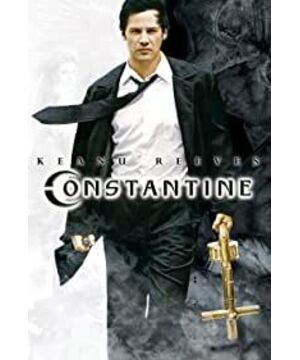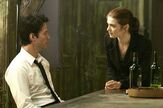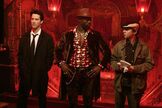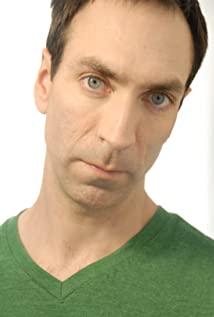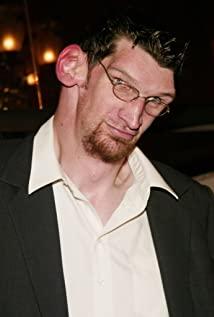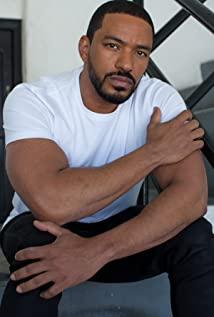"我I think that in this world, everyone’s fate is already arranged. I have died... twice before I understand this truth, as the book says, in the dark, there is a certain number. Only there is People like it...some people don’t.” The
above passage is taken from Constantine’s inner monologue at the end of the film, or a voice-over, filtering out the fatalism in this passage, and the rest is “Some people like and Some people don't like the concept of unspoken rules.
At the beginning of the story, someone inadvertently (although the performance was quite deliberate, assuming it was inadvertent.) picking up a sword, after picking it up, his soul seems to be unable to control itself. Seeing this in the story, I think of the pharaoh's curse, or some unknown mysterious event or a huge conspiracy about to begin. In fact, the director here laid a hidden rule of foreshadowing for the next thing.
Then the camera turned around and came to the scene of Constantine's exorcism (my first thought was that Keanu Reeves lost weight, the actor was too hard). Pulling open the curtains, the sun shines in, and then Reeves, who claims to be Constantine, stands in front of the window and shines the shadow back and forth on the victim through the sun's several coins in his hand. Until there was a shadow that made the victim the most painful, he chose that as an exorcism weapon. The exorcism began. It is worth mentioning that it is the first time I have seen a mirror as an auxiliary weapon to expel the demon from the victim. This intention is very special. Is it because I want to say that the most powerful enemy is only myself. Then the demon was driven out. As for the things he told the person holding the mirror that he was not allowed to see what happened during the exorcism, I knew someone would look at it. This was necessary to prove that Constantine was an experienced exorcist.
After the exorcism, the fat priest who introduced him to this business came out to greet him a few words, I am a little vague here, as if at this time he knew that the twin sister was going to die, and a lot of things would happen and he started asking him to help. In return for Constantine to help him end this business incident. If only the first half of the passage is left, you're welcome, I will do better business in the future. I can understand this kind of greetings alone. Intermediaries, we have them all around us, if you give him some benefits, they will help you find work. This is the rule of the game.
The heroine appeared in the prayer room from the very beginning, telling us that she was a police officer, and she would always kill some suspects without knowing it was uncontrollable. On the one hand, she felt that her hands were stained with blood as a crime, but on the other hand, she felt that she was a police officer. What happened was so suspicious that the other party could shoot me without seeing it clearly. She asked the priest to tell her. The priest who can't see this face is definitely the first passerby arranged by the director, so he played the card according to common sense, but just said some examples and passed it. At that time, I thought to myself, um, you are about to meet Constantine.
Then we inserted the fact that the heroine had a twin sister who jumped off the building. This obvious segment is to elicit Constantine, but the method is a bit rough. The surveillance video can mysteriously capture the last sentence her sister said before jumping off the building, Constantine. I can’t help but feel a little disappointed. I personally think that there is absolutely no such thing as a mirror incident.
The heroine found Constantine, and the director will let them continue to develop anyway, so those excuses for rejection can be ignored. So we interspersed with the bar where the fat priest and supernatural people gathered. The fat priest's death was premeditated. He first used his supernatural powers to find a piece of information that was most likely to be a spiritual event, and then went back to the source and found the twin sister's morgue to study the corpse. Then I met the devil, and then he was killed by the devil. This story tells us, don't be nosy, you will die if you do more injustice. Regarding the bar, I am in charge of the entire typical my site. Even if you have supernatural powers, you still need to know whose territory it is. Don't look at the face of the monk to see the face of the Buddha. As the owner of the landlord’s bar, I guess he knew the whole story from the beginning, stupefied that he bet God and the devil that we shouldn’t get involved or be nosy and rejected Constantine’s request. I also told him very politely, don’t be too arrogant, don’t be too miserable, even though you are the old man named Hades to ask you to go to the region. Don't involve me.
Now continue to talk about the follow-up development of the heroine and Constantine. Sure enough, they later became angry with the same enemy. The heroine proposes to restore her spiritual power, which is the focus of the whole story. This allowed the son of Satan to achieve its original goal, and the director's large-length introduction slowly became formal. congratulations. Then, after the spiritual power was restored, the son of Satan appeared on time, and he snatched her away. Then I waited for Constantine to go back and get the weapon to find the son of Satan to settle the account. The director is a lovely person, and the ending is not like all blockbuster movies. The hero is desperate to maintain peace and it is over. It is estimated that he has read Mr. Jin Yong's novels, especially the section of the steamer chess game in Tianlong Ba Bu. So Constantine held the broken glass and cut it deeply, and the blood flowed irregularly all over the place. Then Satan appeared. Satan is very happy to say Ahaha, I can take you away when you are dead. Constantine said, it’s been 20 seconds since I have waited for 20 years. Go in and see what your son is doing. Satan walked over with a suspicious look and saw an angel holding a sword and preparing for a C-section. He grabbed the "mother" angrily and told his son, "Let's go home, kid, it's enough." It's really fatherly, and then he also smartly ignored the deviant angel. When he came out, he started discussing the cover-up fee with Constantine. He asked, what do you want. Constantine said very gentlemanly, I want the twin sister to be resurrected. Satan was very happy when he heard it. He thought that this way, I can take you back to hell and fix you and be a good person. Let the girl return to the world, killing two birds with one stone. Why not do it? Obviously he is not as smart as Constantine, such a good self-sacrificing person, how could God let him go to hell? He still wants to bring him back to heaven. Only then did Satan know that he had been fooled, and he would not give up unless he died, so he could never give him to God, and decided to let him live for a while. Anyway, his act of suicide at a rate of 30 cigarettes a day will come to my report sooner or later. , Let him go for the time being. So he took out the garbage in his lungs and left angrily. This story tells us that family ugliness should not be publicized, and it is worth paying for a cover-up fee. As for the deviant angel, the two small wings on his back after being abandoned by God felt a bit disgusting. Constantine naturally gentlemanly ignores her. We all know that the best way to treat someone you hate is to ignore and let him fend for himself.
After that, I don’t care if Constantine and the heroine have a lingering ending. The ending of the cover fee is already a comedy reunion. It's just that I have to mention the ad that is particularly attractive for implanting ORIS watches. At first I saw the shadow of a watch in a small corner under the screen, and I wondered if it was Omega because I knew that the watch would appear in that corner for a commercial film. Soon the answer appeared, it was not Omega, it was ORIS. Then I wondered that in the whole film, only Constantine kept smoking and smoking, and there was no cigarette brand.
Finally, the director said, there are no unspoken rules, this is fate.
. "Like at The Book (Pic), His-Work of He Works in Mysterious Ways"
"It's not like IT IS Always in at The Books."
Translation:
As the book says, somewhere, is its own.
There is a gap between reality and books.
View more about Constantine reviews


